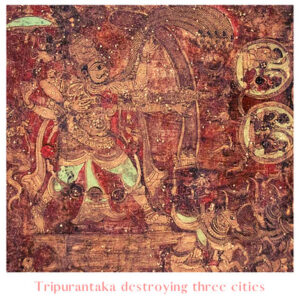Virupaksha murals – Hampi’s ode to art

The Virupaksha Temple is one of the most stunning landmarks in India and the main centre of pilgrimage at present-day Hampi, or Vijayanagara – the capital of the Vijayanagara empire. The mesmerising murals in this temple were painted 500 years ago at the height of the empire.
The Vijayanagara style of painting, as it came to be known later, was a combination of the Chalukya, Chola and Pandya styles. The characteristic features of the Vijayanagara art were the simplicity and vigour in their depiction. There was an attempt to capture a sense of movement and energy in the painted figures.


The themes depicted in the paintings were mainly from the puranas and the epics. They include several of Shiva’s manifestations; Girija-Kalyana; the ten incarnations (Dashavataras) of Vishnu; the figures of the Dikpalas (the protectors of all directions/regions); as also the classic scene of Sita’s Swayamvara.
Amazed to have written an entire post without mentioning any sculpture or architectural elements that Hampi is so famous for – that’s how rich in cultural heritage this area is!
Read about another set of painting masterpieces from neighbouring Lepakshi, which represent a much-advanced stage of the Vijayanagara art.
